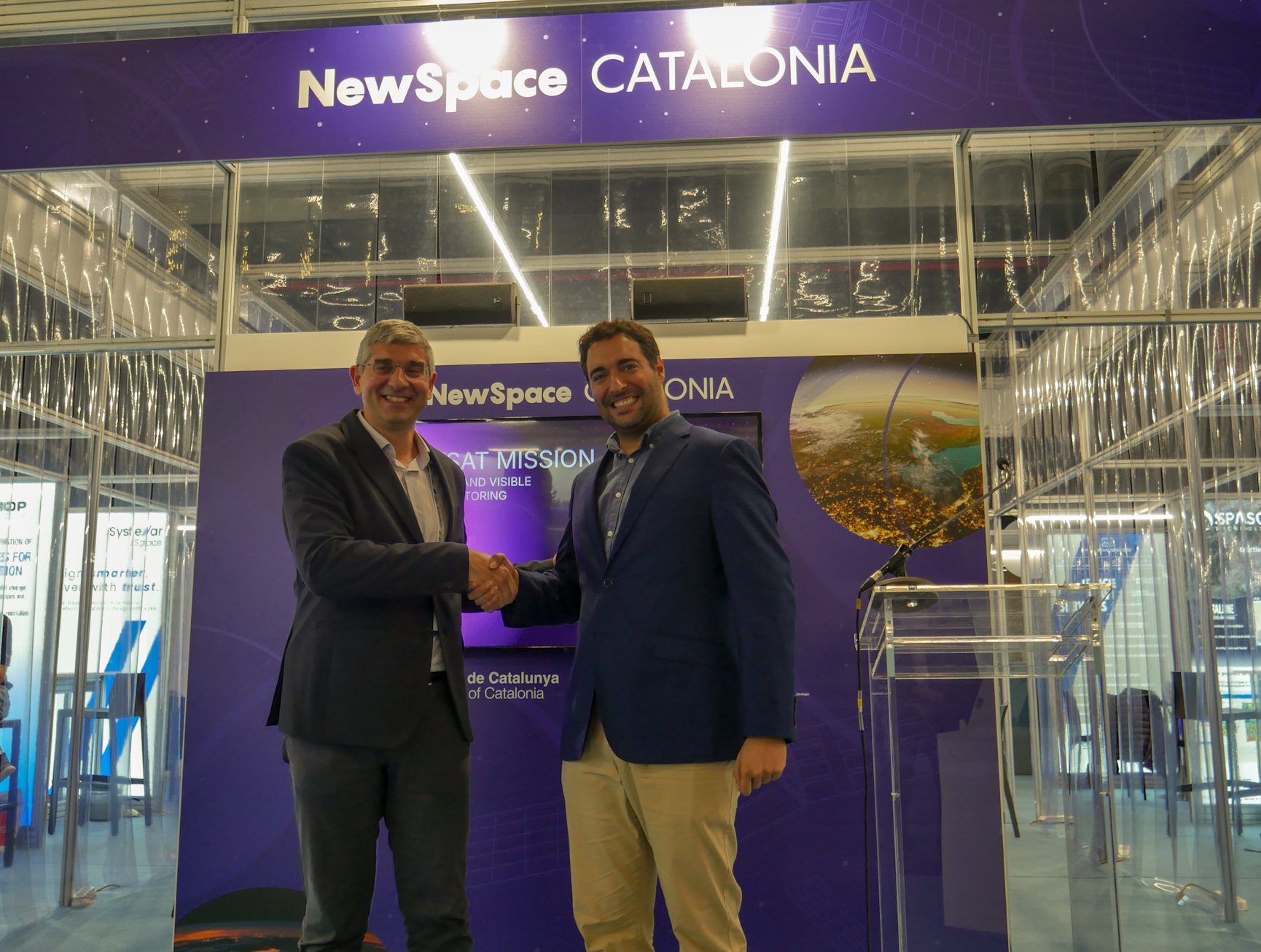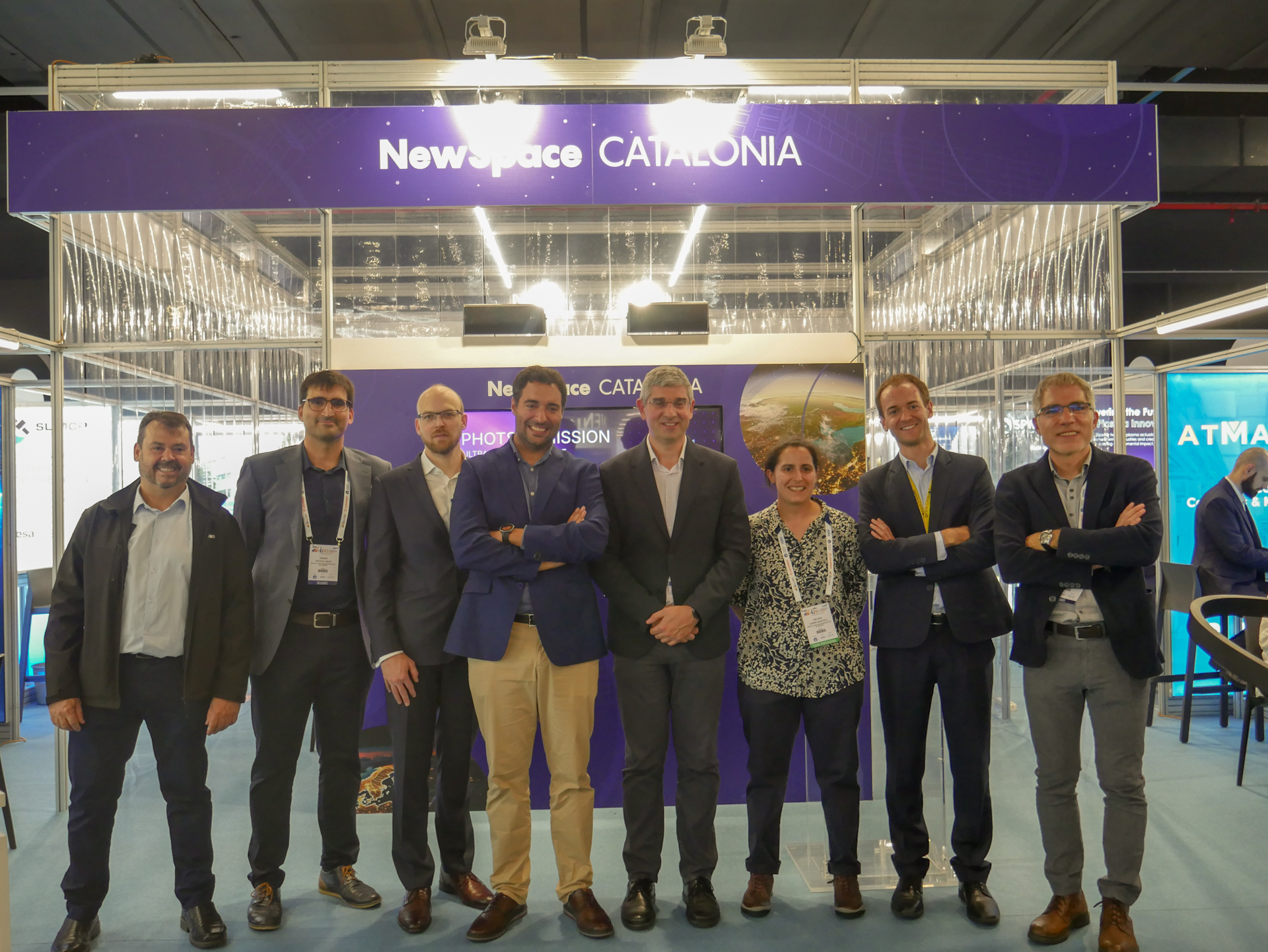The IEEC selects Open Cosmos as prime contractor for its PhotSat mission
- PhotSat is the first satellite developed from design to operations by the IEEC
- Open Cosmos will design and build the platform of this new satellite, and it will be responsible for operations
- The mission will obtain photometric monitoring of the complete available sky in the visible and ultraviolet bands every two days

Caption: The IEEC director, Ignasi Ribas, and the CEO and founder of Open Cosmos, Rafel Jordà, at the presentation of the collaboration.
Credits: IEEC.
Space tech company Open Cosmos will design and build the platform of PhotSat, a space mission coordinated by the Institute of Space Studies of Catalonia (IEEC — Institut d’Estudis Espacials de Catalunya) that involves the development and construction of Catalonia’s first-ever owned satellite dedicated to track the 10 million brightest stars and other astrophysical objects. It was announced today during the celebration of the International Astronautical Congress, which is held from 14 to 18 October in Milan, Italy.
The mission is conceived to provide supporting data to numerous on-going international programmes. More specifically, this kind of observations will be relevant to search for exoplanets, characterise stars and observe bright transient phenomena such as supernovae and kilonovae.
This 12U CubeSat will feature an astronomy payload designed and built by the IEEC. Equipped with two telescopes, it will scan and photometrically track the entire available sky every 2 days in the visible and ultraviolet spectral bands through an ingenious system of rotating mirrors. Expected to launch by the end of 2025, the satellite will orbit the Earth in a Sun synchronous low orbit at a minimum altitude of 500 km.
A new collaboration focused on scientific purposes
This new partnership between Open Cosmos and the IEEC follows previous collaborations such as the successful launch of Menut, the second satellite mission of the NewSpace Strategy of Catalonia promoted by the Government of Catalonia. Open Cosmos will design and build the platform of the satellite, including the design of a pointing system with enough precision to enable the satellite to obtain images of the most distant stars.
The company will also provide the infrastructure to operate the satellite and transfer all the generated data to the Instrument Operations and Science Data Centre of the IEEC.
Opening up access to the Universe
PhotSat represents a significant milestone for Open Cosmos, demonstrating its expanding platforms and capabilities as one of Europe’s leading space tech companies. It also underscores the IEEC’s capacity to lead the full development and exploitation of scientific space missions and commitment to establishing a new space innovation hub in the region, driving economic growth and enhancing research infrastructures in space for the benefit of the research and talent ecosystem.
The mission will also develop the academic and industrial infrastructure in order to carry out future end-to-end missions and projects using smallsat technology in-house in short development time.
Ignasi Ribas, the IEEC director, said: “PhotSat will be the first scientific satellite owned by the IEEC and developed entirely, from the design phase to operations, by us with the collaboration of the Catalan academic and industrial ecosystem. The satellite will observe and monitor the full sky every few days and will provide valuable information to expand our knowledge of space and the universe. PhotSat will prove that small satellites can deliver big science.”

Caption: IEEC and Open Cosmos teams involved in the PhotSat mission.
Credits: IEEC.
In turn, Rafel Jordà, CEO and Founder of Open Cosmos, said: “We’re thrilled to announce the development of PhotSat in partnership with the IEEC. This is a major milestone for both of us, as it marks the first time we are developing an astrophysical satellite, which will generate valuable experience around NewSpace technologies and will contribute to enhance public-private collaboration.”
The PhotSat project has been supported by the Spanish Ministry of Science, Innovation and Universities with funding from the European Union NextGenerationEU (Recovery, Transformation and Resilience Plan, PRTR-C17.I1) and by the Government of Catalonia.
Contacts
IEEC Communication Office
Castelldefels, Barcelona
E-mail: comunicacio@ieec.cat
About the IEEC
The Institute of Space Studies of Catalonia (IEEC — Institut d’Estudis Espacials de Catalunya) promotes and coordinates space research and technology development in Catalonia for the benefit of society. IEEC fosters collaborations both locally and worldwide and is an efficient agent of knowledge, innovation and technology transfer. As a result of more than 25 years of high-quality research, done in collaboration with major international organisations, IEEC ranks among the best international research centres, focusing on areas such as: astrophysics, cosmology, planetary science, and Earth Observation. IEEC’s engineering division develops instrumentation for ground- and space-based projects, and has extensive experience in working with private or public organisations from the aerospace and other innovation sectors.
The IEEC is a non-profit public sector foundation that was established in February 1996. It has a Board of Trustees composed of the Generalitat de Catalunya, Universitat de Barcelona (UB), Universitat Autònoma de Barcelona (UAB), Universitat Politècnica de Catalunya · BarcelonaTech (UPC), and the Spanish Research Council (CSIC). The IEEC is also a CERCA centre.
